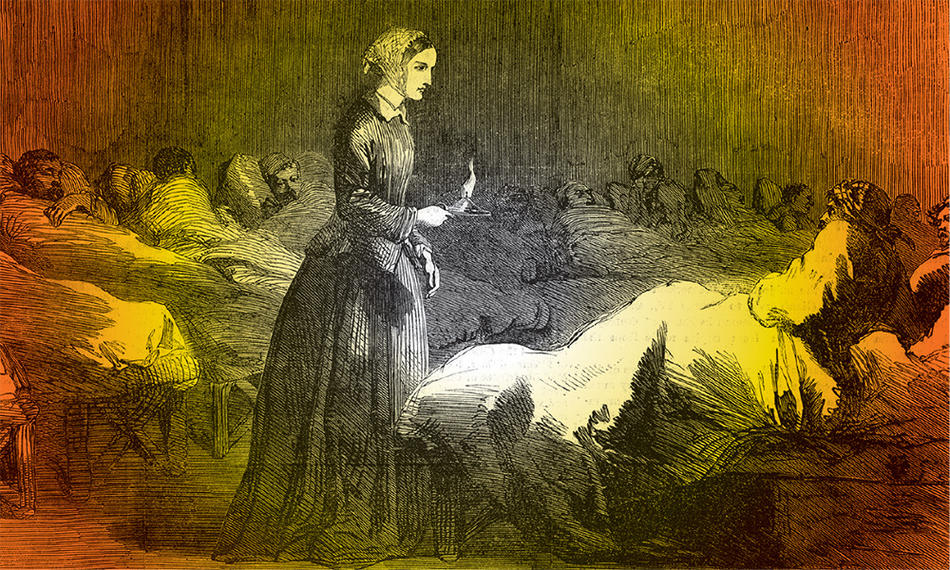The light of Florence Nightingale shines brightly at Columbia. The Augustus C. Long Health Sciences Library houses one of the world’s richest collections of materials relating to the nursing superstar, including letters, a family Bible, photographs, diary fragments, and an inscribed first edition of Nightingale’s groundbreaking 1860 work Notes on Nursing. And this September, Lorraine Frazier, dean of the School of Nursing, planned to celebrate the bicentennial of Nightingale’s birth by taking alumni to key sites in the life of the fabled Victorian health reformer.
Frazier’s tour of London, organized by the Alumni Travel Study program, was to have included visits to the Florence Nightingale Museum, the National Army Museum, and the Nightingale memorial in St. Paul’s Cathedral. But the trip was postponed due to COVID-19 — a pandemic that evokes Nightingale’s legacy. “Like today, illness was more common in areas without health resources, and Florence would go to where people were underserved and vulnerable,” says Frazier.
Born in 1820 to an aristocratic English family, Nightingale was a brilliant, educated, iron-willed woman who revolutionized health care and established the modern nursing profession. Her parents opposed her desire to become a nurse, viewing it as demeaning. Nevertheless she persisted. “She wasn’t interested in being a woman of wealth,” says Frazier. “She knew what she wanted in life; she had a calling.”
In 1854, during the Crimean War, Nightingale, who had trained as a nurse with nuns in Germany and France, led a group of nurses to the Scutari Barrack Hospital in Constantinople to care for ailing soldiers shipped there from the front lines. The conditions at the hospital were appalling, says Frazier. Disease, filth, and vermin were rife, and Nightingale, a demon for hand-washing and hygiene, gained insights into ventilation and sanitation. “She really was ahead of her time,” Frazier says.
In her nightly rounds among the rows of hospital beds, Nightingale earned the moniker Lady with the Lamp, a vision of comfort to the dying. She returned to Britain a celebrity and prominent health advocate and in 1860 founded a nursing school at St. Thomas’ Hospital in central London — the first in the world and the model for future nursing education. “Florence was a trailblazer,” Frazier says. “She studied Greek, Latin, and mathematics and pioneered statistical methods that we still use today.”
Frazier grew up in Northern Ireland, where, she says, nurses are venerated. When she was eight, her parents, escaping the political unrest of the region, immigrated to America, settling in Houston. A few years later, Frazier’s father developed renal disease, and Frazier ended up spending a lot of time in hospitals. “We didn’t know the health-care system, and we were scared,” says Frazier. “My father was sick, and my mother didn’t know how we were going to survive.” After years of dialysis and medical setbacks in what Frazier describes as a “family journey,” her father died from his illness, and Frazier recalls how meaningful it was to her that the nurses and doctors showed real empathy for everyone in her family. “They were taking care of our needs and knew what we needed to hear,” she says. “I remember being so grateful. I wanted to be the person to come in the room and show the family that I cared.”
Years later, Frazier and her husband had a child, Molly, who is developmentally disabled and can’t speak or walk. “That has helped me think differently about health,” says Frazier. “She’s the most vulnerable person you could ever meet, and she educates me every day.” Raising Molly underscored Frazier’s belief that “sickness is a family event, not an individual event,” she says.
Frazier can draw a straight line from Nightingale’s values to her own and to those of the school she leads: the conviction that everyone has the right to good health care and a safe medical environment and that health-care workers should be given a well-rounded education. She says the best way to honor Florence Nightingale’s legacy in the US would be for lawmakers to invite nurses to the table to talk about health-care policy. “We’re trusted because we don’t have a conflict of interest in health care. We need to be there when policies are looked at. We’re trained to give that health care, from birth to death. Let us serve on boards and committees and honor that calling that Florence had and that we still have. We’re underutilized and highly educated, and there’s a need for us to be out there. We’re ready."
This article appears in the Fall 2020 print edition of Columbia Magazine with the title "The Nightingale Effect."



